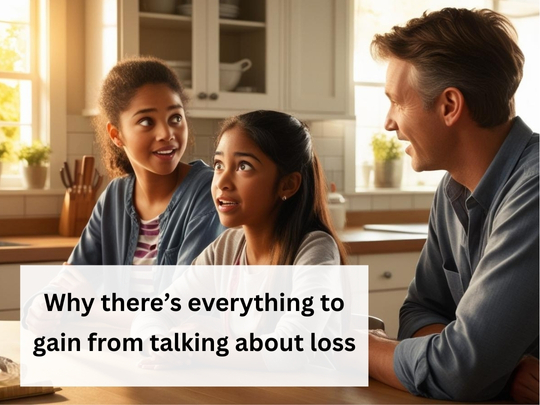
Grief is often tightly interlinked with death, but we can grieve for more than people. During our lifetime we may lose jobs, homes and health. And each loss marks a moment that requires careful processing on how it impacts our identity, and the way we relate to others.
So, when my mother’s 15-year-old cat was put to sleep recently, I took the opportunity to check-in with my family to understand how they were coping, as well as explore their attitudes towards loss. Because, in a society where death remains relatively taboo, it’s not often you can probe without fear of appearing morbid or macabre.
I was struck by what I learnt and leaned into the conversation which surprisingly blossomed. We started discussing my mother’s experience of watching her marmalade tabby being put to sleep, and the accompanied challenge of managing natural human responses to automatic feline twitches as their furry body shut down. From there, we progressed onto the topic of caring for others, what we expect from our ‘third act’, potential regrets and thoughts around what happens to us after we die. It was deep, but it was liberating to connect with someone I love through an experience we’re certain to share in our own time.
I didn’t take my family conversation for granted, but I did take it seriously
This meant talking to my family face-to-face, listening to their perspective without judgment and asking each parent meaningful questions. Interestingly, the conversation was at its healthiest when we were travelling – creating a helpful focal point to distil intensity.
As the eldest child and the executor of my parents’ will, the experience made me feel more comfortable about their experiences so far and expectations to come – adding some colour to the formal paperwork they’d shared with me years prior.
Where some may see a skull and crossbones, others may see this conversation as a gift
Existential therapy is a philosophical counselling model founded on the belief that our capacity for self-awareness means we can reflect, make choices and accept responsibility for how we live, while knowing we have limited time to activate our decisions.
Working with a counsellor, people have uninterrupted time and space to explore the meaning of life, while managing any associated anxiety that arises while navigating life’s challenges. That’s why existential therapy is typically well-suited for people who are bereaved or facing major life decisions such as health treatments, divorce or relocation.
The end is far from comfortable
Research from Let’s Talk About Loss, a grief support charity, highlights that 39% of 18 to 35-year-olds feel uncomfortable talking about death, despite 77% being bereaved. And, it’s easy to understand why.
Loss is messy, requires us to be vulnerable and, for those in the midst of grief, risks opening old wounds. Not to mention, those managing a terminal illness, or supporting a loved one through that process, will have their own unique perspective (which may be further shaped by the developing Assisted Dying Bill).
So, it’s no surprise that Hospice UK promotes Dying Matters Awareness Week (5th – 11th May 2025), an annual campaign that aims to reduce the stigma of death by equipping communities with information and resources to help everyone find the right words.
As difficult as it is when it comes to dealing with the end, perhaps we’d do better not to overthink the start. Recognise your resistance to reconcile your relationship with loss.
I may not have had the right words but, prompted by Pebbles’ passing, I was able to ask some gentle, simple questions. Will you?
If you find the prospect of talking about loss difficult, how would it feel to work with a confidential, non-judgmental counsellor to explore your feelings? The Fountain Therapy Trust offers affordable, long-term in-person and online counselling support for people living in New Malden, Kingston, Surbiton, Wimbledon and beyond. For more details, simply complete our ‘contact us’ form to learn more.
Donna is an integrative counsellor running a small private practice, while supporting The Fountain Therapy Trust.
